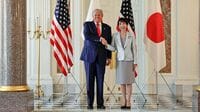TOKYO (Reuters) - Dozens of Japanese members of parliament visited the Yasukuni Shrine for war dead on Tuesday to mark an autumn festival at the shrine, seen in China and the two Koreas as a symbol of Japan's past militarism.
Kyodo news agency said about 80 lawmakers visited the shrine. Health, Labour and Welfare Minister Yasuhisa Shiozaki sent an aide to represent him, an official at Shiozaki's office said. Earlier, Kyodo had said Shiozaki himself went.
The group visit came a day after Prime Minister Shinzo Abe sent a ritual offering to the shrine, prompting a sharp rejoinder from China and a reminder from Tokyo's close ally Washington of the importance of reconciliation over the past.
Visits by Japanese leaders to Yasukuni have outraged China and South Korea because the shrine honours 14 Japanese leaders convicted by an Allied tribunal as war criminals, along with other war dead.
South Korea expressed "deep concern and disappointment" over the shrine visit and offering by Japanese political leaders.
"(We) urge Japanese politicians to gain trust from neighbouring countries and the international community by showing an act of humble introspection and sincere self-reflection on the foundation of the correct perception of history," the foreign ministry said in a statement.
In Beijing, China's foreign ministry also expressed concern.
"We hope Japanese political figures can adhere to correct historical views and do more to realise reconciliation and increase mutual trust with neighbouring Asian countries," spokeswoman Hua Chunying told a daily news briefing.
Abe has visited the shrine in person only once, in December 2013, since becoming premier the previous year. Eager to improve ties with China and South Korea, strained by territorial and other disputes, he has instead opted to send ritual offerings on several occasions.
There was no sign that Defence Minister Tomomi Inada, who has been accused by China of recklessly misrepresenting wartime history, had visited or made an offering at the shrine.
On the previous customary occasion for high-profile Yasukuni visits, the Aug. 15 anniversary of Japan's World War Two surrender, the newly appointed Inada was visiting troops in Djibouti and unable to go to the shrine.
(Reporting by Linda Sieg Additional reporting by Ju-min Park in Seoul and Michael Martina in Beijing; Editing by Clarence Fernandez)



